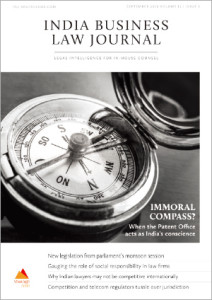“I am what I am, so take me as I am”
These were the famous words of Goethe quoted in the opening paragraph of the recent Supreme Court judgment decriminalizing gay sex. The historic ruling was seen as correcting a long-term wrong that had heaped ignominy, and more, on the country’s LGBT community, who in Justice Indu Malhotra’s opinion was owed an apology. The celebrations that followed were loud and wholly justified.

Evidence that the Supreme Court’s transformative thinking may not be replicated elsewhere is also to be found in a recent decision of the Patent Office to refuse a patent for a sexual stimulation device, which is in essence a moral judgment involving what goes on in the bedroom. The ruling is analysed in our Cover story and raises some interesting legal questions.
You must be a
subscribersubscribersubscribersubscriber
to read this content, please
subscribesubscribesubscribesubscribe
today.
For group subscribers, please click here to access.
Interested in group subscription? Please contact us.



























